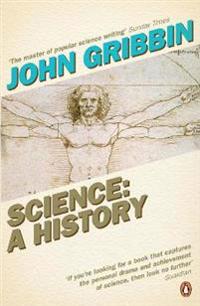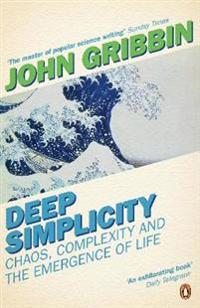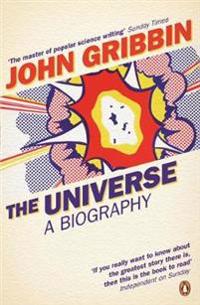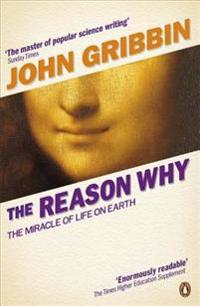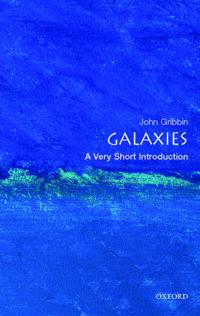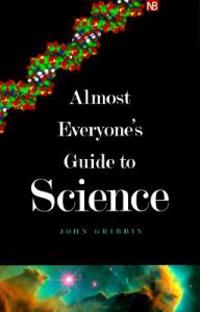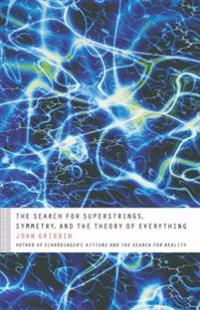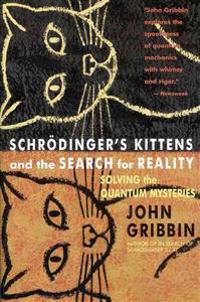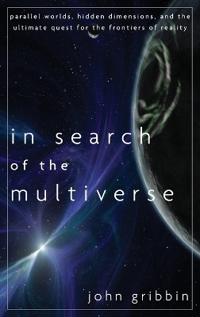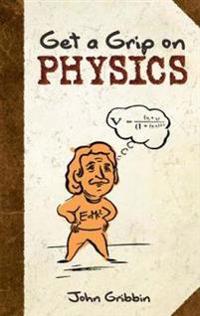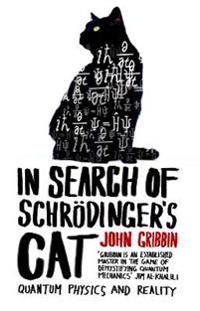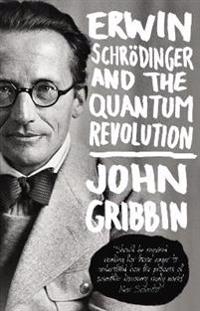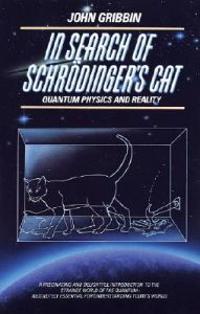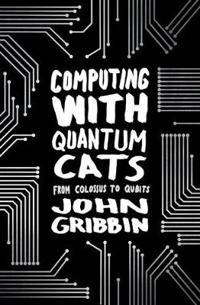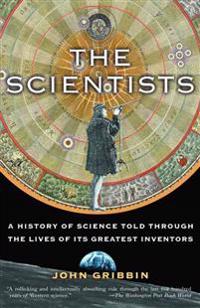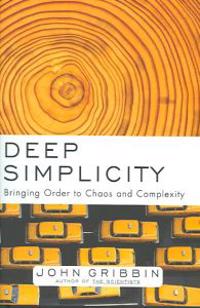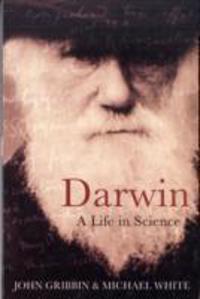James Lovelock: In Search of Gaia (Övrig)
avJohn R. Gribbin, Mary Gribbin
ISBN: 9780691137506 - UTGIVEN: 2009-03-31In 1972 when James Lovelock first proposed the Gaia hypothesis - the idea that the Earth is a living organism that maintains conditions suitable for life - he was ridiculed by the scientific establishment. Today Lovelock's revolutionary insight, though still extremely controversial, is recognized as[...]
Science: A History (Storpocket)
avJohn R. Gribbin
ISBN: 9780140297416 - UTGIVEN: 200308From award-winning science writer John Gribbin, "Science: A History" is the enthralling story of the men and women who changed the way we see the world, and the turbulent times they lived in. From Galileo, tried by the Inquisition for his ideas, to Newton, who wrote his rivals out of the history boo[...]
Deep Simplicity (Storpocket)
avJohn R. Gribbin
ISBN: 9780141007229 - UTGIVEN: 200501Simplifying chaos and complexity theory for the perplexed, John Gribbin's "Deep Simplicity: Chaos, Complexity and the Emergence of Life" brilliantly illuminates the harmony underlying our existence. The world around us can be a complex, confusing place. Earthquakes happen without warning, stock mark[...]
The Universe (Storpocket)
avJohn R. Gribbin
ISBN: 9780141021478 - UTGIVEN: 2008-01John Gribbin's "The Universe: A Biography" explores the story of our cosmos, from the mystery of its origins to how scientists think it might end. How did the universe grow from a tiny fireball to its present size? Where did life on earth come from? How do planets form? How will the universe end? An[...]
The Reason Why (Häftad)
avJohn R. Gribbin
ISBN: 9780141047966 - UTGIVEN: 2012-04In "The Reason Why: The Miracle of Life on Earth" John Gribbin shows what makes our planet so special, explaining why the 'Fermi Paradox' - the apparent absence of alien life - holds the key to our uniqueness. There are several hundred billion stars in our Milky Way Galaxy, yet out of all of these E[...]
Galaxies (Häftad)
avJohn R. Gribbin
ISBN: 9780199234349 - UTGIVEN: 200803Galaxies are the building blocks of the Universe: standing like islands in space, each is made up of many hundreds of millions of stars in which the chemical elements are made, around which planets form, and where on at least one of those planets intelligent life has emerged. Our own galaxy, the Mil[...]
Almost Everyone's Guide to Science: The Universe, Life and Everything (Häftad)
avJohn R. Gribbin
ISBN: 9780300084603 - UTGIVEN: 200008For anyone interested in the remarkable achievements and discoveries of modern science--but intimidated by confusing technical detail--this book offers the perfect solution. Award-winning author John Gribbin stands back from the details and offers a broad picture of science, from the structure of pa[...]
The Search for Superstrings, Symmetry, and the Theory of Everything (Häftad)
avJohn R. Gribbin
ISBN: 9780316326148 - UTGIVEN: 2000-08Few areas of current scientific investigation are as intriguing, contentious, or bizarre as physicists' search for a Grand Unified Theory that would unite all the forces and particles of nature in one coherent mathematical package. Since Einsten's time, this "theory of everything" has become the Hol[...]
Schrodinger's Kittens and the Search for Reality: Solving the Quantum Mysteries Tag: Author of in Search of Schrod. Cat (Häftad)
avJohn R. Gribbin
ISBN: 9780316328197 - UTGIVEN: 1996-05In this eagerly anticipated sequel to the classic bestseller In Search of Schrodinger's Cat, John Gribbin digs even deeper into the mysterious and confounding world of quantum mechanics. Gribbin takes infinitely complex, mind-bending experiments, brings them to life, and makes them accessible to the[...]
In Search of the Multiverse (Inbunden)
avJohn R. Gribbin
ISBN: 9780470613528 - UTGIVEN: 201007Critical acclaim for John Gribbin"The master of popular science."
--"Sunday Times" (London) "Gribbin explains things very well indeed, and there's not an equation in sight."
--David Goodstein, "The New York Times Book Review" (on Almost Everyone's Guide to Science) "Gribbin bre[...]Get a Grip on Physics (Häftad)
avJohn R. Gribbin
ISBN: 9780486485027 - UTGIVEN: 201201A physicist and author of popular-science books offers down-to-earth discussions of string theory, black holes, superfluidity, and other cosmic oddities. Playful engravings and cartoons illustrate these imaginative explanations of the laws of physics and their application to everything from massive [...]
In Search of Schrodinger's Cat (Häftad)
avJohn R. Gribbin
ISBN: 9780552125550 - UTGIVEN: 198502Quantum theory is so shocking that Einstein could not bring himself to accept it. It is so important that it provides the fundamental underpinning of all modern sciences. This title tells the story of quantum mechanics. It investigates the atom, radiation, time travel, the birth of the universe, sup[...]
Erwin Schrodinger and the Quantum Revolution (Häftad)
avJohn R. Gribbin
ISBN: 9780552777599 - UTGIVEN: 201303Erwin Schrodinger was an Austrian physicist famous for his contribution to quantum physics. Schrodinger was working at one of the most fertile and creative moments in the whole history of science. By the time he started university in 1906, Einstein had already published his revolutionary papers on r[...]
In Search of Schrodinger's Cat: Quantum Physics and Reality (Häftad)
avJohn R. Gribbin
ISBN: 9780553342536 - UTGIVEN: 198408Quantum theory is so shocking that Einstein could not bring himself to accept it. It is so important that it provides the fundamental underpinning of all modern sciences. Without it, we'd have no nuclear power or nuclear weapons, no TV, no computers, no science of molecular biology, no understanding[...]
Computing with Quantum Cats (Inbunden)
avJohn R. Gribbin
ISBN: 9780593071144 - UTGIVEN: 2013-06Looking back to Alan Turing's work on the Enigma machine and the first electronic computer, this title explains how quantum theory developed to make quantum computers work in practice as well as in principle. It investigates the potential for this science to create a world where communication occurs[...]
Einstein (Häftad)
avMichael White, John R. Gribbin
ISBN: 9780743263894 - UTGIVEN: 2005-03A reissue of this biography timed to coincide with the 100th anniversary of the theory of relativity and the 50th anniversary of the death of the genius physicist.[...]
The Scientists: A History of Science Told Through the Lives of Its Greatest Inventors (Häftad)
avJohn R. Gribbin
ISBN: 9780812967883 - UTGIVEN: 200408Creates a history of human scientific achievement as revealed by the lives and individual accomplishments of such scientists as Andreas Vesalius, Nicholaus Copernicus, Johannes Kepler, Charles Darwin, Galileo, and Gregor Mendel.[...]
Deep Simplicity: Bringing Order to Chaos and Complexity (Inbunden)
avJohn R. Gribbin
ISBN: 9781400062560 - UTGIVEN: 200504An astrophysicist presents a lucid, accessible explanation of the fundamental principles of chaos and complexity theory, incorporating the latest research with frequent analogies and examples to explore simple applications of the theory in everyday life. By the author of In Search of Schrödinger's [...]
Darwin: A Life in Science (Häftad)
avMichael White, John R. Gribbin
ISBN: 9781847391490 - UTGIVEN: 200902The only book to tackle both Darwin's theories and his extraordinary life, in complementary chapters which reveal how the science is inseparable from the man[...]
Planet Earth (Häftad)
avJohn R. Gribbin
ISBN: 9781851688289 - UTGIVEN: 201201In this lively expedition into the origins, evolution, and workings of our planet, John Gribbin does what he does best: gathers 4.5 billion years of geological history and shares the best bits. Taking an astronomer's perspective, Gribbin follows Earth's development from its beginnings in cosmic gas [...]



